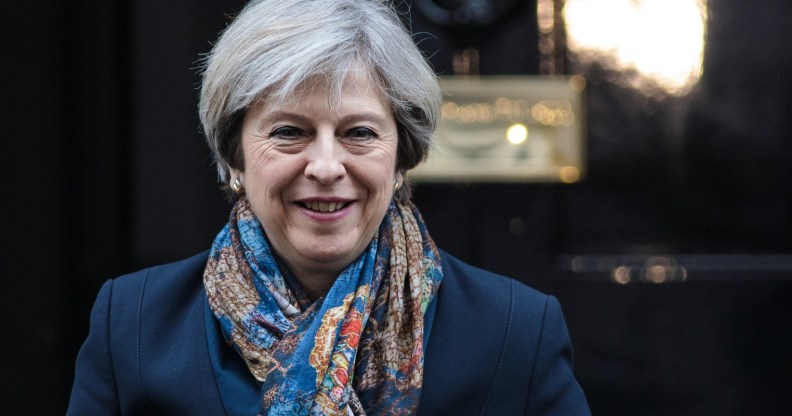PinkNews Q&A: Submit your questions for Prime Minister Theresa May

Prime Minister Theresa May will answer PinkNews readers’ questions in a rare Q&A before the snap General Election.
The leader of the Conservative Party joins Labour leader Jeremy Corbyn, SNP leader Nicola Sturgeon, Liberal Democrats leader Tim Farron and UKIP leader Paul Nuttall in facing your questions ahead of the June 8 poll.
Mrs May became leader of the Conservative Party following David Cameron’s resignation in the wake of the Brexit referendum, which saw the UK electorate vote by 52% to 48% to leave the European Union.
She “recently and reluctantly” called for the General Election in a shock announcement on April 18, despite having ruled out the possibility on several occasions since becoming Tory Party leader.
You can submit your questions for Mrs May below:
“Division in Westminster will risk our ability to make a success of Brexit and it will cause damaging uncertainty and instability to the country,” Mrs May said on calling for a General Election, which was later voted for by MPs under the Fixed-term Parliaments Act.
“So we need a General Election and we need one now, because we have at this moment a one-off chance to get this done while the European Union agrees its negotiating position and before the detailed talks begin.”
Mrs May often voted with the Conservative Party’s then-regressive position on LGBT issues including the equal age of consent and adoption by gay couples during her two decades in parliament, however, a closer examination of her voting record has shown a softening on her stance over the years.
In a Question Time appearance in 2010, May said her views had changed and, were she to be voting in parliament today, she would vote differently on issues including adoption by gay couples.
“I think it’s more important that that child is in that stable and loving environment and I have genuinely changed my mind on that,” she said.
In 2004, Mrs May voted in favour of civil partnerships for same-sex couples, while abstaining on the Gender Recognition Act at a time when several Conservatives voted against the legislation.
Perhaps most strikingly, Mrs May pledged a review on same-sex marriage prior to the 2010 election.
Then-Prime Minister Gordon Brown’s Labour Party ruled out same-sex marriage at the time, exclusively telling PinkNews readers: “The provision of ‘marriage’ as opposed to the provision of same-sex or heterosexual civil unions, is intimately bound up with questions of religious freedom.”
Meanwhile, the Conservatives’ pre-poll ‘Contract for Equalities’, which included a foreword by Mrs May, explicitly said that a Tory government would “consider the case for changing the law to allow civil partnerships to be called and classified as marriage”.
When a commitment to equal marriage was omitted from the 2010 Coalition Agreement, as Home Secretary and Equalities Minister, Mrs May convinced the Cabinet to adopt the plans set out by Liberal Democrat minister Lynne Featherstone – eventually resulting in the successful 2013 Marriage (Same Sex Couples) Act.
LGBT issues have not been central to Mrs May’s platform since her appointment as Prime Minister, though when asked if she – as an Anglican – considers gay sex to be a sin, she immediately replied that she did not.
As Home Secretary, Mrs May called for the UK to withdraw from the European Convention on Human Rights, which has been behind many advancements on LGBT rights.
However, recent reports have suggested that should she win the General Election, her government will keep the UK in the ECHR.

